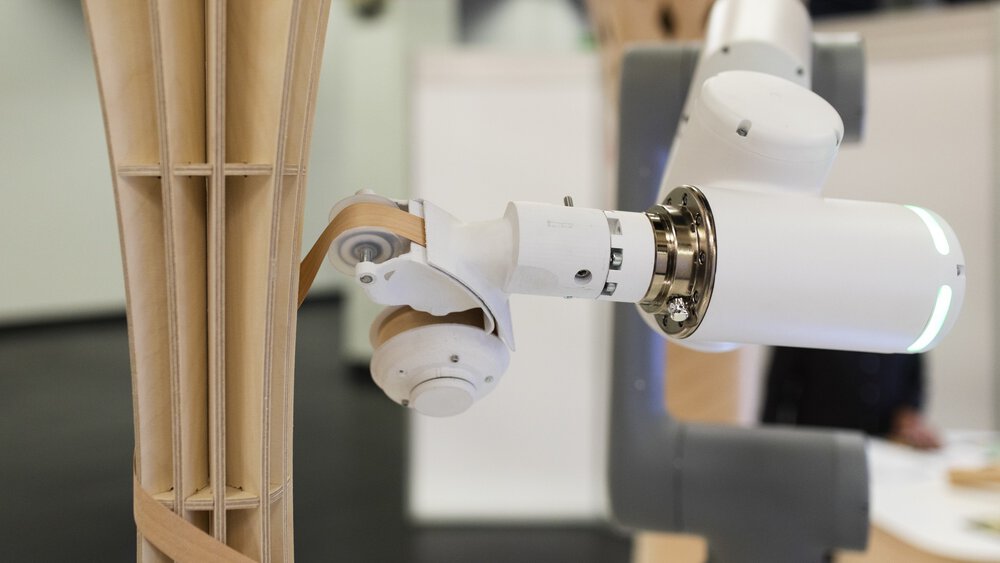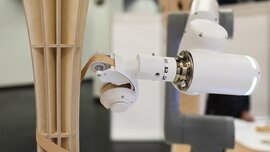Circular building in the digital age
January 10, 2024
- Focus shifting to resource efficiency and recyclability
- Consistent circular economy conserves raw materials for the future
- Digitalization of the construction industry enables resource conservation
In Germany alone, more than 400,000 apartments should be built every year. That also entails an efficient infrastructure with a network of roads and footpaths, along with a future-oriented and sustainable energy supply for these apartments, and newly built kindergartens and schools. However, new construction remains expensive and swallows up additional resources amid the threat of dwindling raw materials. At the same time, valuable existing buildings with their adaptable, resilient building fabric are underestimated or even neglected in many places. digitalBAU 2024, taking place in Cologne from February 20 to 22, 2024, will shift the focus onto circular construction together with exhibitors and specialist forums – in keeping with a continuous material cycle to support conservation and the extensive reuse of resources.
Implementing a circular approach to new construction and revitalization is becoming increasingly urgent. In contrast to traditional construction, in which valuable materials are simply disposed of at the end of a building’s service life, circular construction focuses on returning raw materials to the construction process and the building. Scarce resources and the clearly noticeable effects of climate change—caused, among other things, by the global overexploitation of our recyclables—mean that hardly any other solutions are possible.
We are building and living far beyond our means
In 2023, the Earth’s resource balance was already at zero on August 2, 2023—Earth Overshoot Day was reached on that date. For 50 years now, it has marked the date on which the earth’s annual regenerative budget is spent. That day, after which we “live on credit” on our planet, keeps moving further forward in the year; the date calculated for this year is July 25, 2024.
As one of the largest consumers of raw materials, the construction industry has a major responsibility in this regard and must significantly increase its resource efficiency. According to the German Federal Environment Agency, it alone annually processes more than 70 percent of all raw materials extracted in Germany. The picture is similar in the EU: The resource-intensive construction industry, for example, consumed 37% of the EU’s total steel demand in 2020. This is aggravated by the steady decline in the availability of necessary raw materials such as building sand, aluminum, iron ore, and gypsum. With rising market demand in parallel, it is therefore becoming increasingly important, firstly, to conserve existing resources and, secondly, to reuse and recycle building products and raw materials.
One focus of digitalBAU 2024: resource efficiency and the circular economy
digitalBAU 2024 provides comprehensive answers to the pressing issues of the circular economy, recycling, and resource efficiency. A wide range of digital tools and services in the context of circular architecture will be presented in a host of lectures, panel discussions, and at the stands of highly specialized exhibitors.
The focus will be, for example, on modern planning methods such as BIM, which enable digital and reliable building models, so-called “digital twins” of the built reality, noticeably improve the quality of planning and execution, and optimize material and raw material consumption. Added to that is the increased use of environmental product declarations (EPDs) or PCDS (Product Circularity Data Sheet), a data sheet on the circularity of products. The data obtained in the digital planning process can in turn be collected in material or building passports that are stored on material platforms or in a digital building resource passport, making them available for current and future applications. The concept of circular construction and the associated circular economy in the construction industry only becomes fully circular when digital planning and documentation is combined with digitally controlled manufacturing and production.
digitalBAU lecture program shows the importance of the circular economy
The focus at numerous lectures on all three days of digitalBAU, in the specialist forums, and at the exhibitors’ stands will be on resource efficiency and the circular economy in the construction sector. On day two of the trade fair, for example, circular construction will be a key topic, along with further in-depth expert lectures and panel discussions by the participating trade fair partners of digitalBAU 2024 in Cologne.
Downloads
189761
Belonging images



- PR Manager
